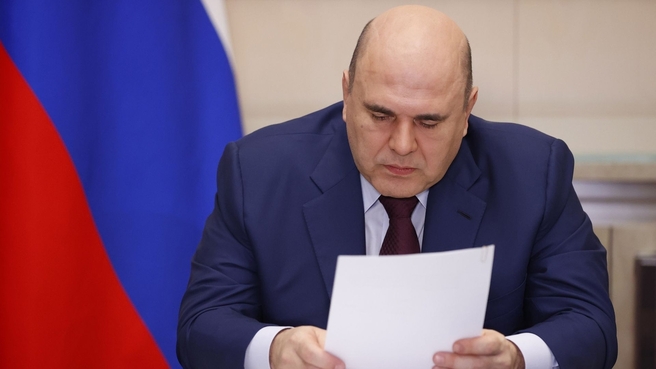Agenda: draft federal laws, budget allocations.
Mikhail Mishustin’s opening remarks:
Good afternoon, colleagues.
Yesterday we visited Voronezh and toured several regional facilities, including the most essential healthcare facility in the region, the children’s clinical hospital. We also visited a defence industry facility that manufactures advanced smart control and communications systems.
This trip rounded up a series of meetings and discussions on key aviation projects. During a meeting in Voronezh, we outlined short-term and long-term development prospects for the aircraft manufacturing industry.
I would like to stress once again that it is a priority for the Government. The President set a task to connect the territories of our big country. We need reliable and competitive Russian-made planes to achieve this goal.
The state will continue to provide all necessary assistance to the industry, primarily to ensure an extensive upgrade of Russian airlines’ fleets.
The Minister of Industry and Trade, the Finance Minister and the Minister of Economic Development received instructions to present proposals on expanding state support.
In addition to that, I would like to remind you that it is important to provide funding to research projects focusing on next-generation aircraft technology, and to determine the amount of public investment in the development of engineering infrastructure for the scientific centres that will serve as the basis for breakthrough projects.
It is extremely important that we carry through our import substitution efforts. Technology-wise, we must be fully independent from using foreign components in aircraft manufacturing.
Colleagues, implementing these decisions requires your utmost responsibility.
Now let’s turn to the agenda. Today, we will review items on supporting the healthcare system.
Following the President’s instructions, we held on Tuesday an expanded meeting of the Coordination Council on countering the coronavirus.
We discussed in detail the spread of the virus with all regional governors and representatives of ministries and departments. We noted, among other things, that the new strain does not cause a sharp increase in hospitalisations. However, more people need to receive outpatient care. Therefore, we decided to allocate additional funds for such patients. We will transfer 5 billion roubles for this purpose today.
We will allocate an additional 15 billion roubles for the centralised purchase of medications during the pandemic. They will go to regional hospitals and outpatient clinics, as well as federal medical facilities.
I would like to ask the Health Ministry to coordinate the distribution of the medications purchased in a centralised way with Tatyana Golikova who headed an operational working group that we established. It is necessary to closely monitor the availability of medications and prevent shortages.
Despite the complicated coronavirus situation, it is important to continue addressing other health issues, including medical personnel. We hope that many new in-demand specialists will start working in our medical facilities this year. We expect about 11,000 doctors and over 13,500 mid-level care providers. We will send 17.3 billion roubles to the budget of the Federal Compulsory Medical Insurance Fund. There should be no delays in the payment of salaries. I would like the regional authorities to carefully monitor this.
The pandemic has proved once again that doctors, nurses and other medical personnel are among the most important occupations. We are grateful to them for all they are doing to protect the health and lives of our people.
One more issue. The Government continues working to improve the quality of life in the Far East. This week, we held a strategic session with the participation of deputy prime ministers, ministers and regional governors of the Russian Federation. We discussed a number of measures aimed at attracting people to the Far East. Our conversation was productive and we will report its results to the President.
A package of draft laws has been prepared for the current Government meeting. It simplifies some working procedures for a number of investors on priority development territories (PDT) in this area.
Additional benefits will be provided to entrepreneurs who win tenders for building affordable housing and other facilities designed for comfortable living. They include housing and utilities, transport and social facilities. This construction will take place on PDTs. Investors will receive PDT status after a simple procedure and the benefits prescribed by law, mostly on insurance premiums and taxes.
We hope these measures will speed up the construction rates in the Far East. The demand for housing there is high, partly, owing to low-interest mortgages. The 2-percent mortgages in the Far East are popular enough. It is even lower than that at some banks. As for the price of one square metre of housing, it is much higher than the national average.
The suggested draft package should help us lower the costs of housing and make it more affordable to people. It is also necessary to interest developers by offering them beneficial working conditions in the federal district.













